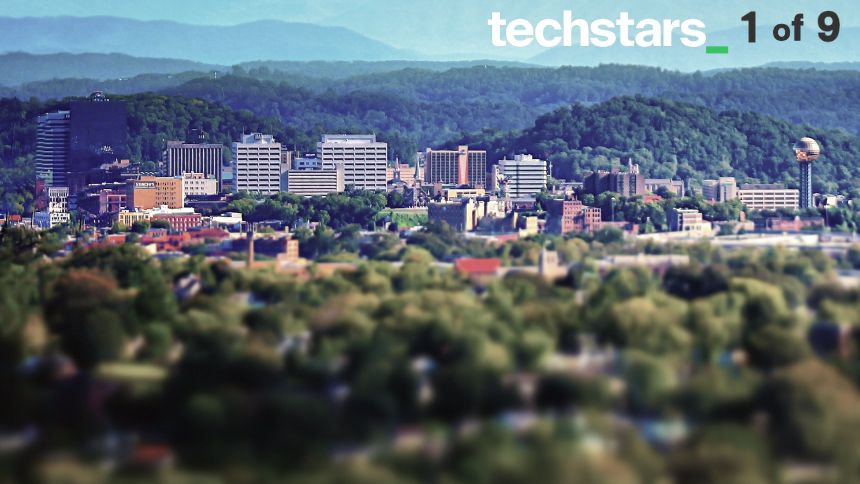
Techstars | Eolic Wall founded by husband and wife team
The couple from Peru are former bankers who are developing an unconventional, modular, and highly efficient wind energy system to generate on-site electricity for homes, communities, and commercial and industrial businesses.
The only team in Cohort 2 of the “Techstars Industries of the Future Accelerator” that is remaining in Knoxville for the three months of the program is Eolic Wall, and the husband and wife who co-founded the start-up five years ago could not be happier with the decision.
“We have been welcomed by the community,” Natalia Cardenas said. “It really surprised us that everyone is willing to be of help. We had not seen that anywhere else.”
Both Cardenas, who is the start-up’s Chief Business Officer, and her husband – Alfredo Calle, Chief Executive Officer – are former bankers in Peru who have been married 12 years. She says of her former profession that “I thought I could do something better . . . (it) was not fulfilling.” Calle is even more direct, saying, “Working in banking wasn’t challenging anymore.”
Today, they are all in on developing an unconventional, modular, and highly efficient wind energy system to generate on-site electricity for homes, communities, and commercial and industrial businesses.
They describe their work as enabling a new market of similar size to the current solar distributed generation but using technology that does not involve the huge windmills that characterize the industry today.
Cardenas says their calling started in 2016 with the idea that they could make a difference by helping accelerate energy transition that results in a better planet.
“Alfredo’s passion for science caused him to dig in and learn,” she says. He was trained as an economist and earned his MBA from the HEC Business School in Paris, France which included an exchange program in the Booth School of Business at the University of Chicago. Years later, Calle went back to school and earned a Ph.D. in Science & Energy from the National University of Engineering in Peru.
Small government grants – the biggest from their native country was $100,000, prize money from start-up competitions, and self-funding helped the couple advance the technology so far.
“We got to a point where we had to do something,” Calle said, with Cardenas adding, “Innovation and hard tech usually do not come from South America, so the ecosystem there is not prepared for this specific kind of risk that requires patient capital.”
That led them to programs like Techstars.
“We learned about the ‘Industries of the Future Accelerator” after the deadline had passed for the first cohort,” Cardenas said. They waited anxiously until applications opened for the new cohort that began in April.
Their excitement includes the “Big Three” organizations that underwrite the program which they note represent a unique opportunity for start-ups like Eolic Wall. Both the University of Tennessee, Knoxville, and Oak Ridge National Laboratory are R&D assets for tech-based companies, while the Tennessee Valley Authority is the nation’s largest public utility with a strong commitment to environmental and sustainability actions.
“It’s really cool about the partners,” Cardenas says. “Three together in one location . . . we are made for this (program).”
We asked about the Technology Readiness Level (TRL), and Calle said it was at a 4. That’s defined as having the individual components work together as a system. “We expect to be at TRL 5 (technology validated in a relevant environment) by the end of 2023 and a TRL 7 (system prototype demonstrated in operational environment) by the end of 2024.”
Eolic Wall says that its device doubles wind speed, allowing the production of more power from the same wind source. It is modular and compact, suitable for distributed generation, and works with a magnetic levitation rotor that minimizes friction. All of these technological advancements show that this small-scale wind energy system can reach an efficiency as large as the efficiency of the gigantic windmills that are familiar to individuals.
The company draws a comparison between its Eolic cells and Legos, explaining that the Eolic blocks can be fitted to every single energy need and grow gradually as required.
The engaging couple says that things are moving the right way with the program, and they are going to get the most out of their three months in Knoxville.
(EDITOR’S NOTE: All of the 10 companies will be pitching at the “Industries of the Future Summit powered by Techstars” scheduled for 9 a.m. to 5 p.m. June 21 at The Mill & Mine, 227 West Depot Avenue, Knoxville. To register, click here.)
Like what you've read?
Forward to a friend!

